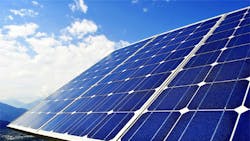EU Defies Beijing, Berlin to Impose Levies on Chinese Solar Panels
BRUSSELS -- The European Commission on Tuesday imposed anti-dumping duties on imports of Chinese solar panels, defying German-led opposition and dire warnings from Beijing the move could spark a trade war.
"Today, the European Commission has decided unanimously to impose (punitive) tariffs" on Chinese solar panels, after finding they were being sold at up to 88% below cost in the European market, EU Trade Commissioner Karel De Gucht said.
De Gucht said it "is clear that the dumping" is harming the European solar panel industry, with 25,000 jobs threatened as Chinese companies take 80% of the market.
Accordingly, the Commission would levy an initial average tariff of 11.8% from June 6, rising to 47.6% on August 6 in the absence of negotiations based on a Chinese commitment to address the problem.
"I want a fair solution with China," De Gucht said, adding that Tuesday's decision opened the way to talks, if Beijing wanted them.
"The ball is now in China's court."
The commissioner insisted that the measures were not protectionist but rather within the EU's rights under international trade law to protect its interests.
China has solar panel production capacity equal to 150% of world demand, he said, and that meant they were manufacturing too much.
The tariffs are provisional for six months, with EU member states having a vote in December on whether to make them permanent or not.
In recent weeks Germany has led growing opposition to the move, winning the support of 17 other member nations including Britain but not France. Berlin says the tariffs are not needed, stressing the wider trade relationship with China which was worth some 500 billion euros (US$650 billion) last year.
But De Gucht said it was up to the Commission, the EU's executive arm, to make the final decisions in trade matters as it was "independent" and sees the "bigger picture."
German Economy Minister Philipp Roesler said as the announcement was being made that it was "a serious mistake", with Berlin firmly opposed.
Chancellor Angela Merkel pointedly said late last month as she hosted visiting Chinese Premier Li Keqiang that Germany would do all it could to resolve the problem without tariffs.
De Gucht noted shortly afterwards that he was aware of the pressure China was exerting and that he was determined to resist it at all costs.
Asked about this backdrop to Tuesday's announcement, he said: "This is a very reasonable decision."
The EU and China now find themselves locked in a series of trade disputes, ranging from solar panels and telecoms for Brussels, to chemicals and steel tubes for Beijing, amid concerns they could lead to broader trade war.
China had warned last month that introducing tariffs on solar panels could result in just that outcome, which both sides also say they want to avoid.
The case was initially brought to the Commission by EU ProSun, which groups European solar panel makers who have suffered most from Chinese imports. But other companies in the solar energy industry relying on imported components from China have lobbied equally hard against imposing tariff, saying they will be counterproductive and hurt the business overall.
"Any level of duties will severely hurt demand, causing job losses and dealing a massive blow to the European solar industry," the Alliance of Affordable Solar Energy (AFASE) said.
It said profit margins were already very tight and so even duties "as low as 11 percent will put a halt to most of (solar energy) projects in the EU".
For its part, EU ProSun said it was "relieved that the European Commission finally introduced concrete measures ... against Chinese dumping.
"Dumping is fraud and harms the future of solar energy and must be relegated to the past," it said in a statement.
France welcomed the EU decision as "balanced and responsible."
A joint statement issued by the ministers of industrial renewal and foreign trade, Arnaud Montebourg and Nicole Bricq, called for responsible action and solidarity among European Union members in view of the final decision.
The Commission's decision is its single most important anti-dumping action, covering a market worth 21 billion euros, and follows similar steps in the United States.
-Bryan McManus, APF
Copyright Agence France-Presse, 2013
About the Author
Agence France-Presse
Copyright Agence France-Presse, 2002-2025. AFP text, photos, graphics and logos shall not be reproduced, published, broadcast, rewritten for broadcast or publication or redistributed directly or indirectly in any medium. AFP shall not be held liable for any delays, inaccuracies, errors or omissions in any AFP content, or for any actions taken in consequence.
